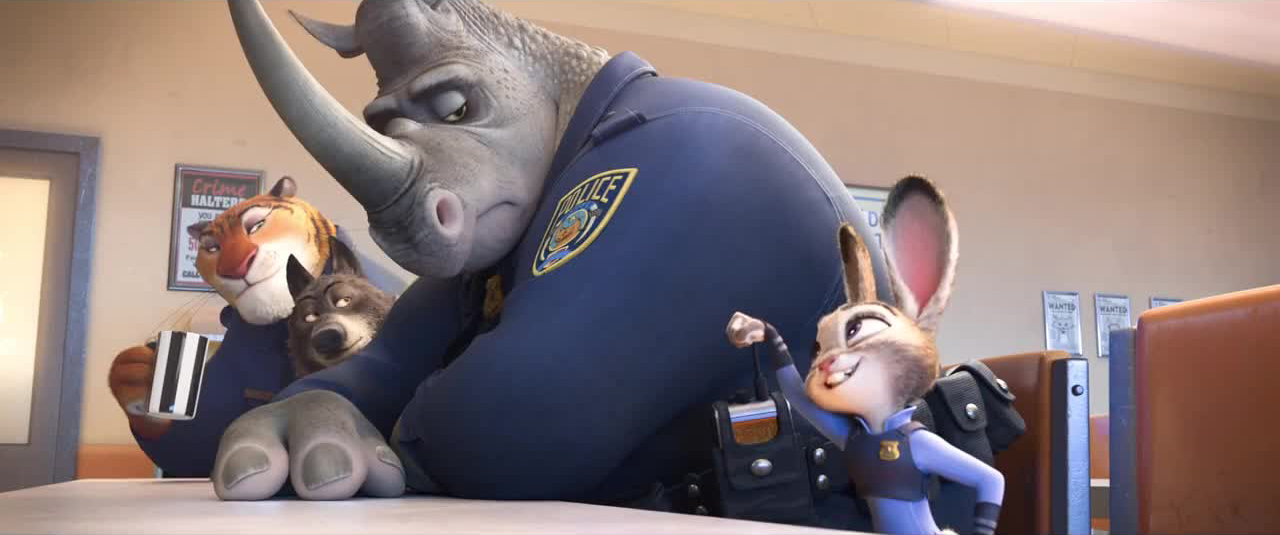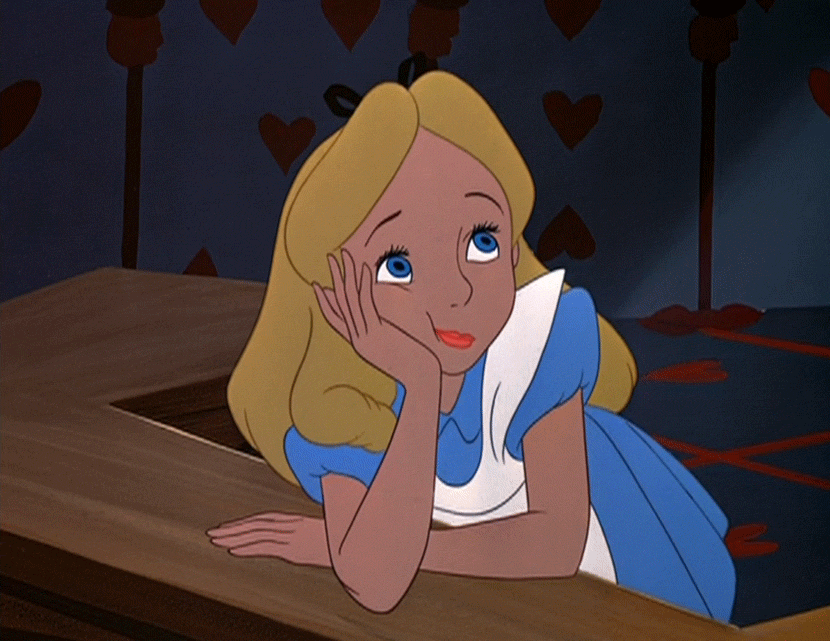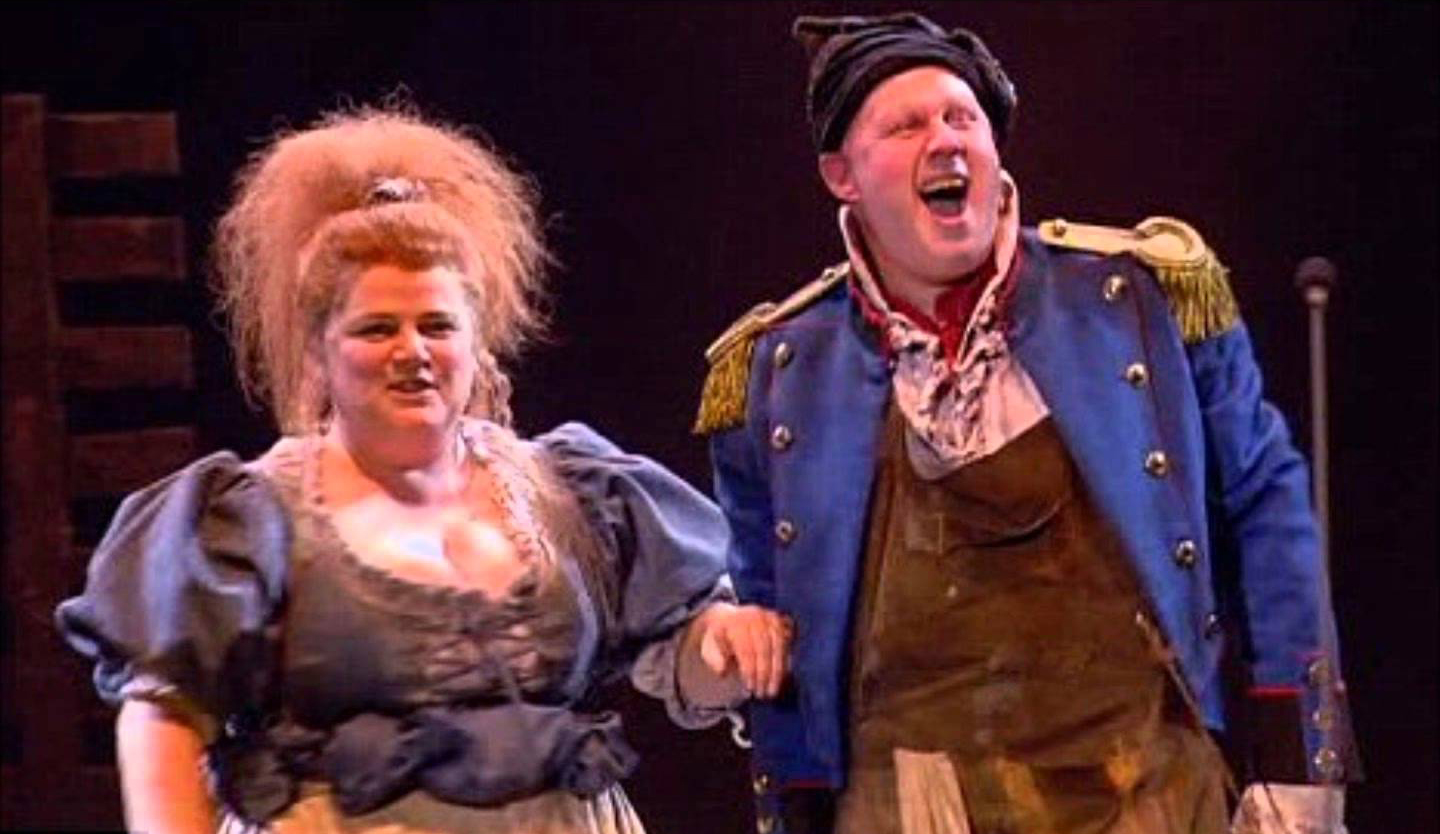
Wow, I can hardly say how impressed I am with Zootopia! As someone who blogs about feminism and politics in Disney films, rather in spite of myself I've followed Wesley's advice and gotten used to disappointment. It's easy to feel a certain amount of thoughtless traditionalism is simply baked in, and our decades of criticisms about Disney will never quite fix it. Watching Zooptopia, on the other hand, I felt like....
I guess that means Disney's next move will be whatever the social justice equivalent of shouting "COME ON, DOVER! MOVE YOUR BLOOMIN' ARSE!!!" at Ascot is ... I can't wait:

In all seriousness, though, it is simply delightful to see a Disney film not only strive to incorporate a more enlightened worldview, but do such a damn good job of making an innovative and entertaining movie while they're at it. Certain people (like these) reflexively respond to cultural critics by accusing us of being out to ruin all that is good and holy in cinema (the possibility of wrong, boring and uninspired conservatism perhaps weakening a movie never seems to cross their minds, I've noticed...). It is so damn satisfying to see Disney put out a fun, thoughtful, and very creative script that shows how much our entertainment will benefit from taking a more progressive view of the world!
So, if you haven't seen Zootopia yet, go see it! Right now!! If you have, keep reading...
**Spoilers for Zootopia from here on out!**

I was continually impressed with how much Zootopia seemed to learn from the usual pitfalls of feelgood-movies-that-teach-us-about-prejudice-in-the-simplest-way-possible. The most unforgivable sin is, of course, "Our movie has a noble message so it has to be good and there's no need to develop the characters or think about their motivations!" (*cough*Pocahontas*cough*): whereas Zootopia actually created a multifaceted view of how people experience and perpetuate prejudice. I mean, I don't usually think of Disney movies as a likely medium for deconstructing and criticizing microaggressions, but dammit they did! More than that, the film addressed prejudice as something beyond what only bad people do, and instead showed it as something normal people do. It illustrated how prejudice can infiltrate well-meaning peoples' thoughts without them realizing or consciously endorsing their biases. We've all had enough of tolerance fables in which a doe-eyed ingenue couldn't be mean to a soul if ze tried, and teaches everyone else out of the pureness of zir heart (or, ingenue is prejudiced for exactly the first 10 minutes, has a transformative experience, and then their prejudice is simply and completely over). It is not only more accurate, but so much more INTERESTING to see a movie in which the protagonist-we-all-imagine-we'd-be-because-of-course-we're-pure-hearted-like-she-is not only fucks up, but fucks up BIG TIME. It's evocative and intriguing to see characters actually struggle with how they perceive others, and what dehumanization (or de-mammalization in this case, perhaps?) their own biases and foibles lead them to accept at face value. How do we understand how we fit into a complicated world and how do we work to change a system when we can't even tell when we're upholding it?
Zootopia also delves into a far more multi-faceted examination of how stereotypes affect people than the usual "Help, Help, I'm being repressed!" that we generally get from morality tales. Certainly, characters actively resist those stereotypes that they feel are holding them back, but in other cases characters find meaning and identity in their stereotypes (Nick clearly enjoys being a clever fox, and as for Judy, well, props to whoever got the line "but we do know how to multiply!" into a Disney movie!). Even more interesting, the movie manages to show how people can internalize negative stereotypes about themselves and strikes the difficult balance between sympathizing with how cultural prejudice has negatively affected its less-than-perfect characters, and showing the value of rising above. We see characters with multiple ways of dealing with their stereotypes, from Judy who actively and consciously strives against others' doubts about her, to Duke Weaselton who has unquestioningly adopted the low expectations set for him, to Flash who splits and adopts a diametrically-opposed hobby (and is a menace to public safety to boot!) in his secret life. By far the most interesting here is Nick, who is genuinely hurt by the prejudice about foxes, and in some ways is clearly conducting cons and hustles because it is the only option available to him, but at the same time he is also proud of his roguish ways and enjoys some of his lawbreaking. It is impressive that the writers of Zootopia managed to convey that much of his ne'er-do-well actions and attitudes are the result of being discriminated against and betrayed, while also showing that even when characters--out of economic necessity or psychological internalization--adopt these stereotypes, the culture at large still bears some responsibility for confining people to these stereotypes in the first place. It's a more nuanced look than we usually get from the thief-with-a-heart-of-gold trope:

Which has its good moments too, I'll be the first to admit...
One of the most refreshing things about Zootopia, and one of the most interesting areas of moral ambiguity, is the fact that it doesn't devolve into Inspiration Porn. It shows that social justice is not only relevant when the oppressed people are unbearably saintly or noble enough to make privileged groups feel good about themselves for supporting a cause. It isn't afraid to show people getting worn down and even corrupted by oppression and discrimination, and unlike the frequent refrains of "no saint" that are often employed to redirect conversations about systemic injustice in our national conversation, in Zootopia we see that society has an obligation to correct its biases even if victims don't always respond to their marginalization in the most perfect, palatable, or inspiring way. In fact several characters--Nick, Bellwether, Mr. Big, Weaselton--remind me in many ways of the Thénardiers in Les Misérables. We understand that they are morally problematic, but the text remains clear that the unjust circumstances in which they live have played a large part in fostering their pettiness and/or depravity. We look at the Thénardiers and the unsavory characters in Zootopia with an understanding that we cannot focus all our disgust on them as individuals without realizing that we, the presumed educated and comfortable at-least-middle-class reader or moviegoer both benefit from a society that exploits people and have not had to contend with being downtrodden, nor do we know what effect such circumstances would have on our psyches.

Yeah, just tell me you'd do any differently. Go ahead.
That said, it is all too easy to swing to far in the other direction, as immortalized in Monty Python's quip "A'right, it's a fair cop, but society is to blame." By presenting such a wide spectrum of well-rounded characters who each respond to oppression and privilege in a different way, we understand that there is both a component of a grossly uneven playing field, and a role for individual perseverance. We recognize that Bellwether is a villain and is responsible for her actions even as we see the systemic marginalization that hurt and corrupted her. Zootopia has space in its moral universe to both acknowledge that the constant disparagement she faced was wrong, while not giving her a pass for her choice to turn prejudice against others instead of working to dismantle it. The movie is clearly encouraging us to be more like Judy Hopps, but it also shows it's unsustainable to create a society where everyone is expected to fight against expectations as tirelessly as Judy does. More significantly, it also shows that defying expectations like Judy does comes with the moral obligation to challenge biases against others instead of just oneself, and that even if one is keenly aware of biases holding oneself back, one can still propagate biases against others without meaning or wanting to.
Finally, Zootopia provides an excellent range of commentaries on the injustices in our society in a way that both fits into its own universe and is entertaining and subtle. We witness multiple axes of privilege and see how collective guilt manifests itself on marginalized groups. That said, it would appear in the setup that most predators are relatively privileged, so the quick reversal of fortune that befalls Mayor Lionheart and others is slightly unrealistic (after all, it seems no amount of shooting rampages by straight white men have made them pariahs in our society!). However, while Mr. Otterton is a predator the police force is clearly uninterested in devoting resources to him, a pretty blunt demonstration of unequal protection that I was both surprised and impressed to see in a Disney movie! And of course, as a fox Nick clearly has a marginalized identity. So, perhaps predator and prey are not specific axes of privilege in Zootopia a priori, where privilege seems to be conferred via Aesop's fable stereotypes and whether a creature would attract visitors in a modern human-run zoo. Our own society is no stranger to certain stereotypes becoming more active causes of discrimination, as the last 15 years of anti-Muslim fearmongering can attest. Zootopia also mirrors our own celebrity culture and celebrity activism, as we see animals on the newsreels behaving like Trump voters and Gazelle trying to use her platform to counteract that. Other aspects of political inclusion are more subtle, but powerfully convey where this society's prejudices and priorities lie, and this appears brilliantly in the production design and world-building which, without ever having a spoken line that I recall, shows just how political accessibility is. We see infrastructure that is built for animals of multiple different shapes and sizes, but as soon as we see Judy struggling to get to a much-too-high chair in the police briefing room, we understand immediately that this society does not think she belongs there.

This spatial obstacle shows unequivocally that "Mammal Inclusion Initiative" or no, this society will maintain the intertia of its unexamined barriers against those whom it doesn't welcome in certain places. We also don't need to see specifically how Little Rodentia is underserved, but with the police disinterest in Mr. Otterton we grasp intuitively how a Godfather-inspired crime ring could easily fill the vacuum that official social investment has left in abandoning the less-impressive mammals, much like how the actual Mafia cemented its influence on favors for needy people who had few other resources available.
And somehow, Zootopia managed to pack all this social commentary into a story that felt internally consistent, offered an engaging mystery, and portrayed relatable characters who felt like real people (well, mammals...) rather than cut-out clichés. It used its examination of our society as a jumping-off point to give depth to its storytelling rather than preaching at us. I have to say, Disney: I'm impressed.

Regarding the quick fall of the predators from privilege, I wondered if it was designed to mimic the world that the children watching may grow up into. One where movements like the 'mammal inclusion initiative' have been successful and led to ethnic minorities being in lots of positions of power and on the surface all is right and good. But underneath all the PR is an extremely delicate and fragile balance and it only takes one or two unfortunate and isolated incidents, for fear-mongering by the media etc. to tear everything down as they see fit. To me it felt like it was preparing children to see through the machinations of villains who seek to divide by fear like Bellweather i.e. It was trying to teach them to see everyone as people and not to see groups and division just because the media or those in charge might tell you to. Which I thought was rather clever.
ReplyDelete